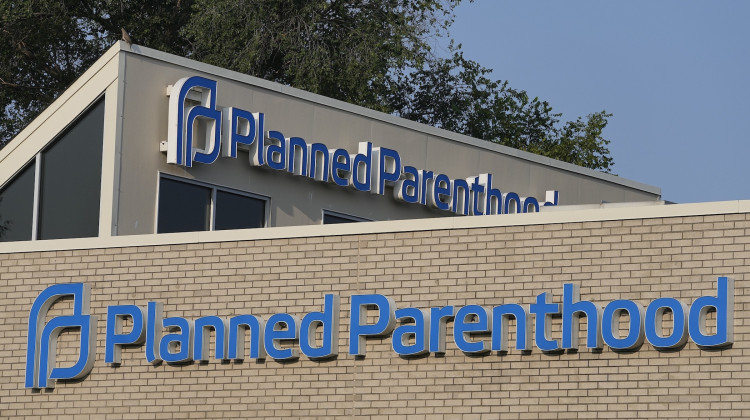
Marion County Public Health Director Dr. Virginia Caine recommends to wear a mask inside public places, especially as the highly-infectious Omicron-variant has been detected in Indiana.
Doug Jaggers/WFYIOver the weekend, health officials in Indiana confirmed the first case of the omicron variant in the state. The arrival of the highly infectious variant – now identified in at least 45 states – comes when hospitals across Indiana are already facing critical shortages.
The omicron variant has spread much faster across the U.S. than health officials anticipated, putting hospitals in a vulnerable position as cases threaten to overwhelm intensive care units that are already stretched thin. Marion County Public Health Department Director Dr. Virgina Caine said Indianapolis’ hospitals are seeing a mild COVID-19 surge at a time when non-COVID cases are also rising.
“We're seeing hospitalizations for chronic diseases that I think was a result of people not undergoing their regular medical care,” Caine said. For example, she said, more patients are getting hospitalized because their diabetes or blood pressure is “out of control.”
In Indiana’s Region 5 – an eight-county area that includes Marion and surrounding counties – only 13 percent of ICU beds are available, as of Dec. 20. That’s compared to about 16 percent statewide – down from 26 percent during the late-summer delta surge.
“We have never had this many total patients in our hospitals and we will soon match or surpass the greatest number of patients hospitalized for COVID-19 since the start of the pandemic,” Indiana Hospital Association Brian Tabor said in a statement. “Should the current trends continue, everyone in need of health care could be impacted.”
In Indiana, COVID-19 cases began to rise once again in late October. To date, the vast majority are the delta variant, according to the Indiana Department of Health. State health officials said between 800 and 1,400 COVID-positive specimens are sequenced each week. Recently, Indiana has seen roughly 30,000 positive cases a week.
COVID hospitalizations across the state are approaching the worst of last winter’s surge. In December 2020, more than 3,460 people were hospitalized with COVID-19 across the state. As of Sunday, nearly 3,000 Indiana residents were being treated for COVID.
Departing National Institute of Health Director Francis Collins told NPR’s Weekend Edition: “If Americans don't take COVID-19 seriously, the country could see 1 million daily infections.”
Health officials say the current vaccines remain effective against serious illness or death from the omicron variant. Emerging data also suggests boosters offer increased protection.
Despite this evidence, vaccination rates in Indiana remain low. In some areas of the state, fewer than 20 percent of the eligible population are vaccinated. The statewide vaccination rate is 54 percent.
“For the unvaccinated, you're looking at a winter of severe illness and death for yourselves, your families and the hospitals you may soon overwhelm,” White House Coronavirus Response Coordinator Jeffrey Zients said in a press conference on Dec. 17.
As the holidays approach and people begin to travel and host guests, Caine recommends taking a COVID-19 test 48 hours before a social event and ask about the vaccination status of guests.
“You need to ask, are the folks coming to your house vaccinated?” Caine said. “And if they're not vaccinated, you need to make sure that they're tested within 48 hours, and you have the results before you let them in your house.”
This story comes from Side Effects Public Media — a public health news initiative based at WFYI. Follow Carter on Twitter: @carter_barrett
 DONATE
DONATE






 Support WFYI. We can't do it without you.
Support WFYI. We can't do it without you.